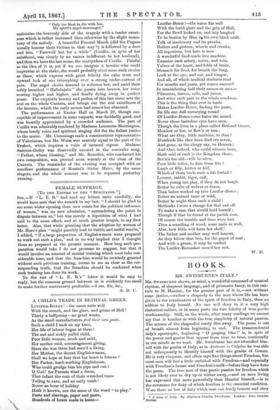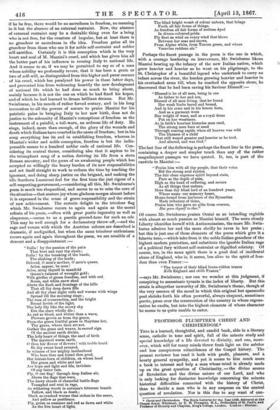BOOKS.
MR. SWINBURNE'S ITALY.*
MR. SWINBURNE shows, as usual, a wonderful command of musical rhythm, of eloquent language, and of prismatic fancy, in this can- ticle to M. Mazzdni ; for the greater part of it is,—not without some justice,—rather a rhapsody to the man whose life has been given to the reanimation of the spirit of freedom in Italy, than an address to Italy herself. No one will deny to it a very high rhetorical calibre, or in many parts the rare felicity of true poetic workmanship. Still, on the whole, after many readings we cannot say that it touches us with the true simplicity of natural passion. The scream of the rhapsodist rarely dies away. The poem is out of breath almost from beginning to end. The transcendental lady's apostrophe, beginning "0 gasping One !" is, in spite of the power and genius that appear from time to time, continually in our minds as we read. Mr. Swinburne has not identified him- self with the genius of Italy, as in Atalanta in Calydon he was able not unfrequently to identify himself with the genius of Greece. He is very eloquent, and often says fine things about Freedom, but most men will feel a little surfeited with Freedom—and especially with Freedom's breast and Freedom's milk—before they have done the poem. The true root of that poetic passion for freedom which is not likely ever to dry up or wither away,—and no man living has expressed this more powerfully than Mazzini himself,—is in the reverence for duty of which freedom is the essential condition. Were there no law of duty which man can freely honour and obey • A Sony of Italy. By Algernon Charles 8winburue. London: Jobn Camden Hottien. if he be free, there would be no sacredness in freedom, no meaning in it but the absence of an external restraint. Now, the absence of external restraint may be a desirable thing even for a being who is not free, for the creature of impulse, but at least there is no grandeur or sacredness in de idea. Freedom gains all its grandeur from those who use it for noble self-restraint and nobler self-sacrifice. Certainly it is this conception which is the very heart and soul of M. Mazzini's creed, and which has given him all the better part of his influence in rousing Italy to national life. And it seems to us, if we may be permitted to say so of a man whose nobility we profoundly revere, that it has been a grain or two of self-will, as distinguished from this higher and purer essence of his creed, which has paralyzed his power in these latter days, and prevented him from welcoming heartily the new development of national life which he bad done so much to bring about, mainly because it is not the one on which he had fixed his hopes, and of which he had learned to dream brilliant dreams. But Mr. Swinburne, in his moods of rather forced ecstacy, and in his long invocation to all the powers of nature to praise Mazzini for his patriotic pains in bringing Italy to her new birth, does not do justice to the solemnity of Mazzini's conceptions of freedom as the instrument of a painful, a toil-worn, an arduous life of duty. He sings, indeed, more than enough, of the glory of the wounds and death which Italians have courted in the cause of freedom ; but in his song everything has its end in establishing freedom, whereas in Mazzini's wider and noble conception, freedom is but the indis- pensable means to a hundred nobler ends of national life. Con- sidering its central theme, considering also that it aspires to be the triumphant song of a nation deriving its life from a stern Roman ancestry, and the paean of an awakening people which has accepted so willingly the heavy burden of its new responsibilities and set itself straight to work to redeem the time by teaching the ignorant, and doing sharp justice on the brigand, and making the idle Southern Lazzaroni feel for the first time the just rigour of a self-respecting government,—considering all this, Mr. Swinburne's poem is much too rhapsodical, and seems to us to miss the core of the situation—that austere joy whose gladness merges almost before it is expressed in the sense of grave responsibility and the strain of new achievement. The ecstatic delight in the tricolour flag which Mr. Swinburne recurs to again and again as the moral refrain of his poem, —often with great poetic ingenuity as well as eloquence,—seems to us a puerile ground-tone for such an ode This may be well enough for a declamatory throw-off,--and the rage and venom with which the Austrian colours are described is dramatic, if undignified, but when the same tricolour enthusiasm recurs again and again throughout the poem, we are sensible of a descent and a disappointment :- "Italia! by the passion of tho pain
That bent and rent thy chain ; Italia! by the breaking of the bands, The shaking of the lands; Beloved, 0 men's mother, 0 men's queen, Arise, appear, be seen ! Arise, array thyself in manifold Queen's raiment of wrought gold ; With girdles of green freedom, and with red, Roses, and white snow shed Above the flush and frondage of the hills That all thy deep dawn fills And all thy clear night veils and warms with wings Spread till the morning sings ; The rose of resurrection, and the bright Breast lavish of the light, The lady lily like the snowy sky Ere the stars wholly die ; As red as blood, and whiter than a wave, Flowers grown as from thy grave, From the green fruitful grass in Maytime hot, Thy grave, where thou art not.
Gather the grass and weave, in sacred sign Of the ancient earth divine, The holy heart of things, the seed of birth The mystical warm earth. 0 thou her flower of flowers ! with treble braid Be thy sweet head arrayed, In witness of her mighty motherhood Who bore thee and found thee good, Her fairest-born of children, on whose head Her green and white and red Are hope and light and life, inviolate Of any latter fate.
Fly, 0 our flag! through deep Italian air, Above the flags that were, The dusty shreds of shameful battle-flags Trampled and rent in rags, As withering woods in autumn's bitterest breath Yellow, and black as death ; Black as crushed worms that sicken in the sense, And yellow as pestilence.
Fly, green as summer and red as dawn and white As the live heart of light, The blind bright womb of colour unborn, that brings Forth all fair forms of things.
As freedom all fair forms of nations dyed In divers-coloured pride. Fly fleet as wind on every wind that blows Between her seas and snows, From Alpine white, from Tuscan green, and where Vesuvius reddens air."
Perhaps the finest passage in the poem is the one in which, with a courage bordering on irreverence, Mr. Swinburne likens Mazzini bearing up the infancy of the new Italian nation, which grew heavier and heavier as he went on his pilgrimage, to the St. Christopher of a beautiful legend who undertook to carry an infant across the river, the burden growing heavier and heavier in his overtasked arms till, when he reached the opposite shore, he discovered that he had been saving his Saviour Himself :— "Blessed is he of all men, being in one
As father to her and son, Blessed of all men living, that he found Her weak limbs bared and bound, And in his arms and in his bosom bore, And as a garment wore Her weight of want, and as a royal dress Put on her weariness.
As in faith's hoariest histories men read, The strong man bore at need Through roaring rapids when all heaven was wild , The likeness of a child That still waxed greater and heavier as he trod, And altered, and was God."
The last line of the following is perhaps the finest line in the poem, containing a deeper and simpler touch than any of the rather magniloquent passages we have quoted. It, too, is part of the canticle to Mazzini :—
"Praise him with all thy people, that their voice
Bid the strong soul rejoice, The fair clear supreme spirit beyond stain, Pure as the depth of pain, High as the head of suffering, and secure As all things that endure.
More than thy blind lord of an hundred years, Whose name our memory hears, Home-bound from harbours of the Byzantine Made tributary of thine, Praise him who gave no gifts from oversee,
But gave thyself to thee."
Of course Mr. Swinburne praises Orsini as an intending regicide with almost as much passion as Mazzini himself. The more closely Liberty identifies herself with Antinomianism, the more Mr. S win- burne admires her and the more shrilly he raves in her praise ; but this is just one of those elements of the poem which give it a falsetto tone,—which take from it the noble Italian grandeur of the highest modern patriotism, and substitute the ignoble Italian rage of a political fury without self-restraint or dignified sobriety. Of course, too, in the same spirit there is a good deal of incidental abuse of England, who is, it seems, less alive to the spirit of free- dom than even France :—
"The torpor of their blind brute-ridden trance Kills England and chills France,"
—says Mr. Swinburne ; nor can we wonder at this judgment, if conspiring to assassinate tyrants is the index of liberty. But this strain is altogether unworthy of Mr. Swinburne's theme, though of the very essence of the mood in which this original but spasmodic poet shrieks forth his often powerful, always eloquent, sometimes poetic, pwan over the resurrection of the country in whose regene- ration he exults, but into the highest elements of whose character he seems to us quite unable to enter.































 Previous page
Previous page